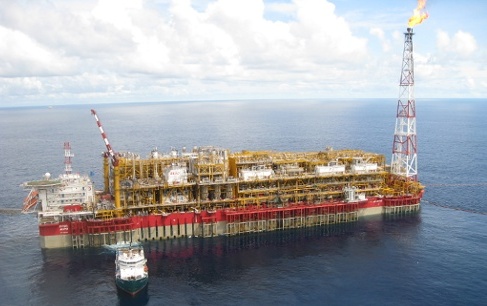
Akpo FPSO ups output to 84 kbs, 58 MMcm/d
- As Akpo West comes online with 14kbd, 4MMscm/d
Sopuruchi Onwuka
One of Nigeria’s old deepwater oil and gas production facilities, the Akpo Floating Production, Storage and Offloading (FPSO) vessel, has encouraged TotalEnergies to start production of satellite Akpo West oilfield.

The French company which operates the Petroleum Mining Lease (PML) 2 license declared that it has brought production from Akpo West online after completing a tie-back development model which flows some 14,000 barrels of condensate per day and 4.0 million cubic meters of natural gas per day from the satellite field to the AKPO FPSO.

Both TotalEnergies and the Nigerian National Petroleum Company (NNPC) Limited announced that partners in the PML 2 started start oil and gas production from the Akpo West field located 135 kilometers offshore Niger Delta.
With the new development the AKPO FPSO would now start pumping some 84,000 barrels of condensate and some 58 million standard cubic meters of natural gas per day.
According to TotalEnergies, output from Akpo West is tied back to the existing Akpo FPSO facility which started-up in 2009 and produced 124,000 barrels of oil equivalent per day in 2023.
“By mid-2024, Akpo West will add 14,000 barrels of condensate production per day, to be followed by up to 4 million cubic meters of gas per day by 2028,” TotalEnergies declared.
The Oracle Today reports that TotalEnergies holds the record of deepwater production hub in the producing PML 2 which is former OML 130 which hosts two FPSOs for Akpo and Egina developments. There is also a gas export pipeline that runs from the field to onshore gathering facility for onward supply to key domestic offtakers.
The FPSOs in the oil block, The Oracle Today reports, confer commerciality on smaller satellite fields including Akpo West and Porewei which the operating company has already lined up for tie-back development model.
TotalEnergies stated that Akpo West development leverages the existing Akpo facilities to keep costs low and minimize greenhouse gas emissions. The project’s carbon intensity is expected to be below 5 kg CO2e/boe and will contribute to reduce the average carbon intensity of TotalEnergies’ portfolio.
Total had earlier used the tie-back model for development of its Ikike Field conventional offshore field.
TotalEnergies’ Senior Vice President in charge of Exploration and Production for Africa, Mike Sangster, “After Ikike in 2022, TotalEnergies is pleased to start production of another tie-back project in Nigeria, Akpo West, which will contribute to maintaining the production of the existing Akpo facilities by developing additional nearby resources. This project fits the Company’s strategy of developing low-cost and low-emission projects.”
“This project leverages TotalEnergies’ solid footprint in Nigeria and will quickly bring value to the country, TotalEnergies and its partners,” he added.
TotalEnergies operates the PML2 with a 24% interest. Its partners in the oil block are China National Offshore Oil Corporation (CNOOC) which holds 45 percent non operating interest; South Atlantic Petroleum (Sapetro) which holds 15%; and Prime 130 which holds 16% stake.
The Nigerian National Petroleum Company Limited is the concessionaire of the production sharing contract (PSC) which governs commercial operations in the concession.
In a separate statement, the national oil company declared that development of Akpo West came in line with President Bola Ahmed Tinubu’s directive on the industry to optimize production from the nation’s oil and gas assets.
The NNPC limited stated that the commissioning of the field development was a “result of meticulous planning, strategic collaboration, and unwavering dedication from all stakeholders involved in the project.”
Chief Corporate Communications Officer at NNPC Limited, Olufemi O. Soneye, stated that “the milestone was enabled by the strategic leadership of the Group Chief Executive Officer (GCEO), Mr. Mele Kyari, and the Upstream Directorate of the NNPC Ltd whose support played no small role in propelling the operators to actualise the short- and mid-term hydrocarbon production goal of the President Tinubu administration.



